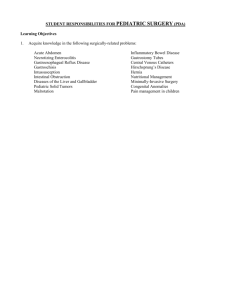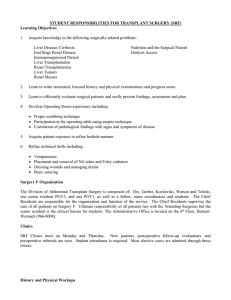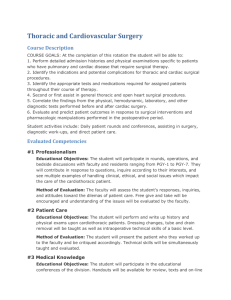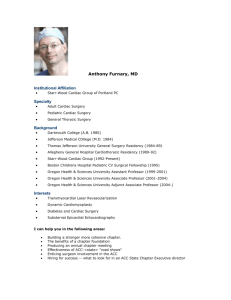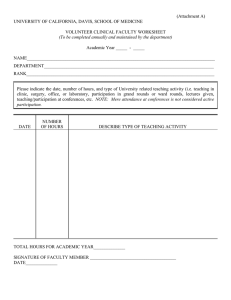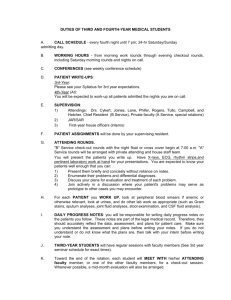STUDENT RESPONSIBILITIES FOR CARDIAC SURGICAL SERVICE Learning Objectives
advertisement
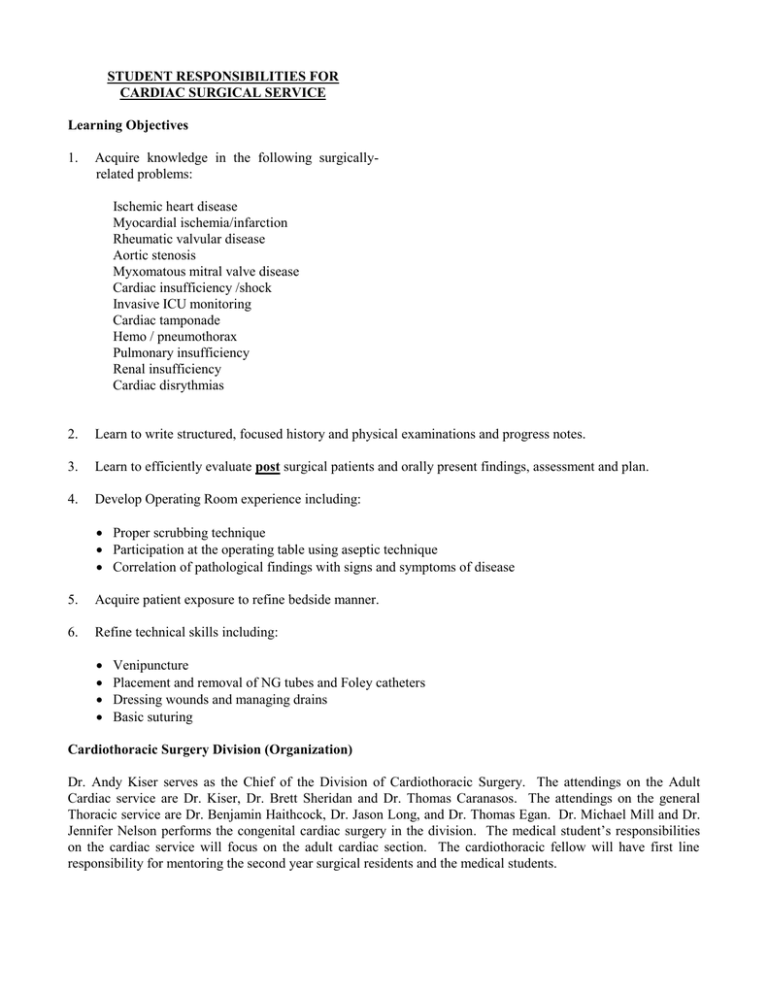
STUDENT RESPONSIBILITIES FOR CARDIAC SURGICAL SERVICE Learning Objectives 1. Acquire knowledge in the following surgicallyrelated problems: Ischemic heart disease Myocardial ischemia/infarction Rheumatic valvular disease Aortic stenosis Myxomatous mitral valve disease Cardiac insufficiency /shock Invasive ICU monitoring Cardiac tamponade Hemo / pneumothorax Pulmonary insufficiency Renal insufficiency Cardiac disrythmias 2. Learn to write structured, focused history and physical examinations and progress notes. 3. Learn to efficiently evaluate post surgical patients and orally present findings, assessment and plan. 4. Develop Operating Room experience including: Proper scrubbing technique Participation at the operating table using aseptic technique Correlation of pathological findings with signs and symptoms of disease 5. Acquire patient exposure to refine bedside manner. 6. Refine technical skills including: Venipuncture Placement and removal of NG tubes and Foley catheters Dressing wounds and managing drains Basic suturing Cardiothoracic Surgery Division (Organization) Dr. Andy Kiser serves as the Chief of the Division of Cardiothoracic Surgery. The attendings on the Adult Cardiac service are Dr. Kiser, Dr. Brett Sheridan and Dr. Thomas Caranasos. The attendings on the general Thoracic service are Dr. Benjamin Haithcock, Dr. Jason Long, and Dr. Thomas Egan. Dr. Michael Mill and Dr. Jennifer Nelson performs the congenital cardiac surgery in the division. The medical student’s responsibilities on the cardiac service will focus on the adult cardiac section. The cardiothoracic fellow will have first line responsibility for mentoring the second year surgical residents and the medical students. Clinics Cardiac surgery clinic meets on Wednesday mornings at 10:00. New patients, postoperative follow-up evaluations, and preoperative referrals are seen. Student attendance is required. Most elective cases are admitted through this clinic. History and Physical Workups A major source of learning is obtained from new admission workups. Students are to obtain a complete history and perform a physical examination on all new admissions or patients seen in consultation who ultimately come to the surgical service for an operation or management. Occasionally, workups may be done during a clinic visit. New patient workups should be shared among students regarding number and diversity of disease processes. Progress Notes Students are expected to write daily progress notes on the patients they are following. These progress notes do not replace the housestaff notes. All progress notes should contain the pertinent subjective (S) and objective (O) findings, as well as a concise assessment (A) and plan (P). The Student Progress Note must be concise and pertinent. Lab data are recorded. Assessment and plans should be discussed with a physician before writing in the chart. Remember the chart is a legal record, and statements should show responsible thinking. A minimum of one Student Progress Note every day until discharge is required. The surgical house staff and Attending physician countersign Student Progress Notes and add comments, corrections, and additions. The Student Progress Note should follow the format outlined: Date Student Progress Note PO Day # ______ S: Events and active complaints since last rounds O: Vitals signs, I/Os including drains and tubes Physical exam, focused New labs A: Concise list of active issues P: Plan for each active issue Operating Room Opportunities Each student should have the gross pathology demonstrated to him/her in the operating room on all the patients he/she is following. Student operating room assignments will be decided the day before surgery to give each student ample opportunity to read and prepare for the particular case. It is expected that each student be familiar with each case on which they scrub. Students should make every effort to see the patients pre-op. At a minimum their chart should be reviewed. Although the student following an assigned patient is expected to scrub on that operation, other students are encouraged to view operations whenever possible during the rotation. All students are expected to be knowledgeable in operating room conduct. It is the student's responsibility to check on the time of the operative procedure so that he/she may plan his/her activities to be present. On Call Students are excused from “Call” while on this 2 week rotation. They are expected to remain for the course of the day until all cases are completed for the day and afternoon/evening rounds are concluded. 2 Orders Students are to learn to write postoperative orders. This is done by observing the housestaff during computerized physician order entry. Proper organization of orders is a high priority. Knowledge of the correct dosage of medicine, proper laboratory tests, and nursing orders is necessary. Conferences There is an abundance of formal teaching sessions that meet on a regularly scheduled basis on Cardiothoracic Surgery. The students should attend as many of these sessions as possible. Priorities include: 1. Medical Student Lectures - 7:30 am Tuesday, Thursday - OR classroom 2. Surgery Grand Rounds - 7:15 am Wednesday, Clinic Auditorium 3. Thursday – 6:45 AM – CT Didactic Teaching Conference – Smith CT Education Center, 3rd Floor BurnettWomack 4. Friday – 7:00 am OR classroom – Division preop / postop conference 5. Tutorials – As scheduled with Attending Physicians Rounds Early morning Work Rounds are conducted by the housestaff to determine any changes in each patient's condition and make decisions regarding management for the day. Students are responsible for keeping abreast of the clinical condition of their patients and decisions for management. It is expected that all patients will have been evaluated BEFORE morning attending rounds by students and/or housestaff. Each morning formal attending rounds begin @ 6:30am in the CTICU. The Attending and Chief Resident supervise rounds with the housestaff and students. Questions and discussion are encouraged. Students should be able to present a brief, concise synopsis of the patient's problem and progress on rounds. Afternoon rounds are scheduled for 5:00 pm in CTICU each weekday. Evaluations At the completion of each rotation, the attendings and housestaff meet to discuss the performance of the students. A consensus evaluation form is then submitted to the Surgery Clerkship Office usually within two weeks of the end of the rotation. Students are encouraged to meet with the Divsion Chief or other faculty members to review their evaluations. 6/24/2014 3
